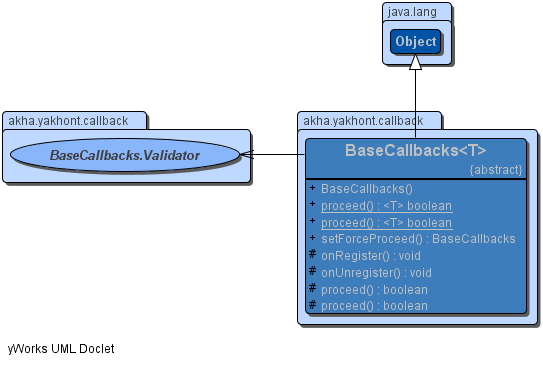- java.lang.Object
-
- akha.yakhont.callback.BaseCallbacks<T>
-
- Type Parameters:
T- The type of objects for which callbacks should be proceeded
- Direct Known Subclasses:
- BaseCallbacks.BaseCacheCallbacks
public abstract class BaseCallbacks<T> extends Object
TheBaseCallbacksis the one of the base classes for working with callbacks. Most implementations should not derive directly from it, but instead inherit fromBaseActivityLifecycleProceed.BaseActivityCallbacksorBaseFragmentLifecycleProceed.BaseFragmentCallbacks.Since the
BaseCallbacksis a base class for callbacks handlers, the instances of it should be registered (it's close to the process of registeringApplication.ActivityLifecycleCallbacks).
The low-level registration goes via call toBaseProceed.register, but most implementations should do it usingBaseActivityLifecycleProceed.registerorBaseFragmentLifecycleProceed.register.After registering, the implemented callbacks are ready to be called for every object of type T. To proceed callbacks the object should be annotated with
CallbacksorCallbacksInherited. Another possibility (to proceed all objects) is to set the "force proceed" flag (seesetForceProceed(boolean)) totrue.Usage example (creating callback handler for
Activity.onActionModeStarted; for more examples please refer toActivity,Fragmentandsimple Activityones):package com.mypackage; import akha.yakhont.callback.lifecycle.BaseActivityLifecycleProceed; public class MyCallbacks extends BaseCallbacks.BaseActivityCallbacks { private static final MyCallbacks sInstance = new MyCallbacks(); private MyCallbacks() { BaseActivityLifecycleProceed.register(this); } public static void myHandler(Activity activity, ActionMode mode) { // proceed annotated Activities only if (!BaseCallbacks.BaseProceed.proceed(sInstance, activity)) return; // your code here (NOTE: you don't have to call activity.onActionModeStarted() - // it's already done by the Weaver) } }Annotate necessary Activities:import akha.yakhont.callback.annotation.CallbacksInherited; @CallbacksInherited(com.mypackage.MyCallbacks.class) public class MyActivity extends Activity { ... }And add the following line to theweaver.config(which says to the Yakhont Weaver to insert the call toMyCallbacks.myHandler()in the compiledActivity.onActionModeStarted()method body - at the beginning or at the end, depending on the 2nd parameter - see below):android.app.Activity.onActionModeStarted before 'com.mypackage.MyCallbacks.myHandler($0, $$);'
Here $0 means 'this', $$ - the list of method arguments (for more info please visit the Javassist site, in particular, Inserting source text at the beginning/end of a method body).The line in
weaver.configshould contain 3 tokens delimited by whitespaces:<fully qualified class name>.method[(signature)] <action> 'code'The possible actions are:
- before
- - insert 'code' at the beginning of the method body
- after
- - insert 'code' at the end of the method body
- finally
- - insert 'code' in the 'finally' clause
- <fully qualified exception name>
- - insert 'code' in the 'catch' clause *
Some other base classes for working with callbacks are
BaseCallbacks.BaseProceed,BaseCallbacks.BaseLifecycleProceed,BaseCallbacks.BaseCacheCallbacksand annotations in theakha.yakhont.callback.annotationpackage.
-
-
Nested Class Summary
Nested Classes Modifier and Type Class and Description static classBaseCallbacks.BaseCacheCallbacks<T>Extends theBaseCallbacksclass to provide cache (of already checked objects) support.static classBaseCallbacks.BaseLifecycleProceedExtends theBaseCallbacks.BaseProceedclass to provide the base object's lifecycle support.static classBaseCallbacks.BaseProceedTheBaseProceedis intended for support ofBaseCallbacksinstances registration.static interfaceBaseCallbacks.ValidatorThe callbacks annotations validation API.
-
Constructor Summary
Constructors Constructor and Description BaseCallbacks()Initialises a newly createdBaseCallbacksobject.
-
Method Summary
Methods Modifier and Type Method and Description protected voidonRegister()The callback which is called when the instance of this class registered.protected voidonUnregister()The callback which is called when the instance of this class unregistered.protected booleanproceed(T object)Checks whether the callbacks for the given object should be proceeded or not.static <T> booleanproceed(T object, Class callbackClass)Checks whether the callbacks for the given object should be proceeded or not.static <T> booleanproceed(T object, Class callbackClass, boolean forceProceed, Map<T,Boolean> cache)Checks whether the callbacks for the given object should be proceeded or not.protected booleanproceed(T object, Map<T,Boolean> cache)Checks whether the callbacks for the given object should be proceeded or not.BaseCallbackssetForceProceed(boolean forceProceed)Sets the "force proceed" flag.
-
-
-
Constructor Detail
-
BaseCallbacks
public BaseCallbacks()
Initialises a newly createdBaseCallbacksobject.
-
-
Method Detail
-
setForceProceed
public BaseCallbacks setForceProceed(boolean forceProceed)
Sets the "force proceed" flag. If set totrueit forces to proceed callbacks for all objects of type T.
The default value isfalse.- Parameters:
forceProceed- The value to set- Returns:
- This
BaseCallbacksobject
-
proceed
protected boolean proceed(@NonNull T object)
Checks whether the callbacks for the given object should be proceeded or not.- Parameters:
object- The object for which callbacks could be proceeded- Returns:
trueif callbacks should be proceeded,falseotherwise
-
proceed
protected boolean proceed(@NonNull T object, Map<T,Boolean> cache)
Checks whether the callbacks for the given object should be proceeded or not.- Parameters:
object- The object for which callbacks could be proceededcache- The cache of already checked objects- Returns:
trueif callbacks should be proceeded,falseotherwise
-
proceed
public static <T> boolean proceed(@NonNull T object, @NonNull Class callbackClass)
Checks whether the callbacks for the given object should be proceeded or not.Usage example (creating callback handler for
Service.onStartCommand; for more examples please refer toActivity,Fragmentandgeneral Activityones):package com.mypackage; public class MyCallbacks { // you can create new class or add handler(s) to the existing one public static void myHandler(Service service, Intent intent, int flags, int startId) { // proceed annotated Services only if (!BaseCallbacks.proceed(service, MyCallbacks.class)) return; // your code here (NOTE: you don't have to call service.onStartCommand() - // it's already done by the Weaver) } }Annotate necessary Services:import akha.yakhont.callback.annotation.CallbacksInherited; @CallbacksInherited(com.mypackage.MyCallbacks.class) public class MyService extends Service { ... }And add the following line to theweaver.config:android.app.Service.onStartCommand true 'com.mypackage.MyCallbacks.myHandler($0, $$);'
Please refer to theBaseCallbacksfor more details.- Type Parameters:
T- The type of object for which callbacks should be proceeded- Parameters:
object- The object for which callbacks could be proceededcallbackClass- The class of the callbacks handler- Returns:
trueif callbacks should be proceeded,falseotherwise
-
proceed
public static <T> boolean proceed(@NonNull T object, @NonNull Class callbackClass, boolean forceProceed, Map<T,Boolean> cache)
Checks whether the callbacks for the given object should be proceeded or not.- Type Parameters:
T- The type of object for which callbacks should be proceeded- Parameters:
object- The object for which callbacks could be proceededcallbackClass- The class of the callbacks handlerforceProceed- The "force proceed" flagcache- The cache of already checked objects- Returns:
trueif callbacks should be proceeded,falseotherwise
-
onRegister
protected void onRegister()
The callback which is called when the instance of this class registered.
-
onUnregister
protected void onUnregister()
The callback which is called when the instance of this class unregistered.
-
-
